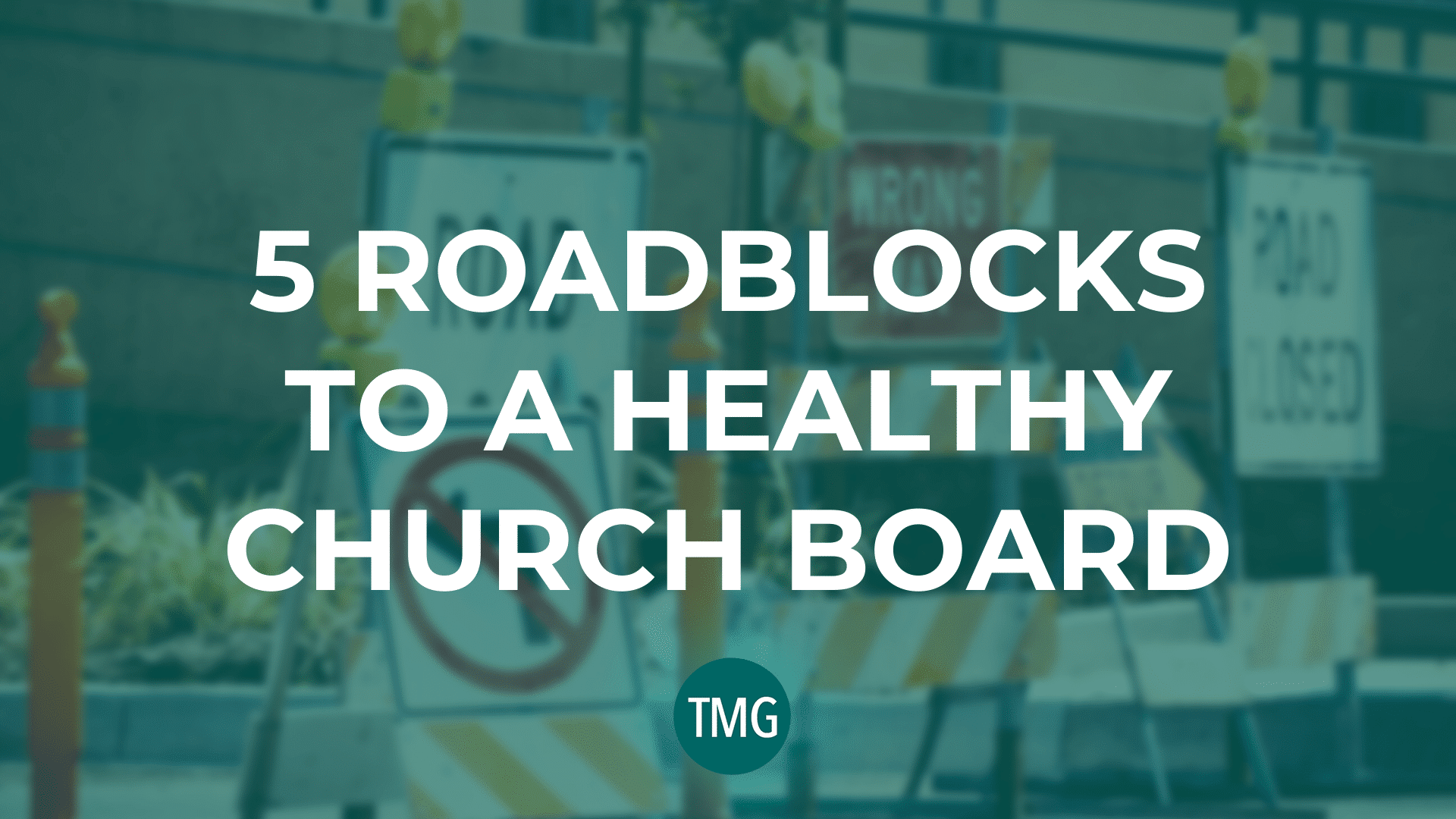Church Revitalization Podcast – Episode 95
Have you ever felt like your church’s board wasn’t reaching its full potential? Most church board members are good people that have good intentions. But they’re often inefficient and ineffective because they don’t know how best to spend their time and energy.
In this article, we’ll share five common roadblocks to a healthy church board and the shifts your team can make to be more effective. Some of the changes we describe might seem like a distinction without a difference. But in truth, these subtle shifts make all the difference.
By avoiding these five roadblocks to a healthy church board, your leaders will thrive as they guide your church to achieve your God-given vision and fulfill the Great Commission.
Subscribe below to never miss an episode.
[podcast_subscribe id=”8838″]
Represents a Constituency vs. Shepherding the Flock
In Western society, we are hard-wired to see leaders as our “representatives.” So it’s not uncommon for parishioners to bring specific problems or complaints to a board member and expect him to lobby on their behalf. While there is nothing wrong with individuals bringing their issues to a board member (that’s good!), the problem comes when the board member feels like he has to fight for that individual or group rather than evaluate the situation through the lens of leading the whole church.
In Acts 6, we see a group within the church (the Hellenistic Jews) bringing a complaint to the apostles about food distribution. If one or two apostles felt like they needed to “stick up” for the Hebraic Jews or others for the Hellenistic Jews, it’s unlikely they would have developed the right path forward. Because they saw this as a “whole church” problem, they perceived a unifying solution. Likewise, recognize that the role of the governing board is to shepherd the whole flock.
Looks for Input vs. Seeking the Lord
Proverbs 15:22 tells us that “Plans fail for the lack of counsel, but with many advisors, they succeed.” There is clear and biblical evidence that seeking input is a good thing! But all good things have a limit. Many church boards get stuck because they solicit advice from too many people and will not decide unless they perceive broad buy-in from the congregation. Some churches even require “full consensus” before making critical decisions; this is a fool’s errand.
Be sure that your board has all the information it needs, but don’t fall into the trap of requiring everyone to contribute to the decision-making process. Leaders often have a perspective that others do not. Additionally, leaders are the ones who are responsible to the Lord for the consequences of their decisions. Therefore, prioritize seeking God’s vision for your church and make decisions that align with a Godly vision. People don’t know what they don’t know; leaders are leaders by God’s design. Don’t neglect input, but don’t get mired in the process of collecting it so that you miss the voice of the Holy Spirit.
Stuck in the Trees vs. Managing the Forest
The third common roadblock to a healthy church board occurs when boards miss the macro problems because they’re too focused on the minor issues. A good analogy here is the difference between a park ranger and a forest manager. A park ranger has an important job. She may deal with park guests, pesky animals, or minor crises. But the park ranger isn’t making the large-scale decisions about when to do a controlled burn or preserve a larger ecosystem. That’s the job of the forest manager. Only he has the data, perspective, and authority to make those decisions. Suppose the forest manager distracts himself with a park guest problem or minor crisis. In that case, he’s likely to allow a more significant, full-scale disaster to occur because he neglected the macro challenges.
In the same way, church boards often feel satisfaction from getting into the weeds. They feel like they’re good servants by stepping into the small stuff and being willing to take on even the most minor tasks to serve the church. The intentions are pure. But because their attention is on the small stuff, they are missing the bigger picture and are enabling large-scale disasters to come towards the church unimpeded. You’ll never solve an ecological disaster by making sure the park restrooms are clean. Likewise, your church will struggle to prevent chronic decline by focusing on picking carpet colors.
Be sure that the staff you hire is empowered to make decisions and execute them. They are accountable to the board, but they ought to have the ability to manage projects and problems. If you don’t empower your staff because you don’t trust them–that’s a problem! Only hire staff you trust to be good stewards of the church’s resources and have the expertise to manage projects and problems.
Low Standards vs. High Accountability
Most boards don’t hold themselves or their staff accountable for performance, only for character. So long as a staff member doesn’t act immorally or unethically, they rarely lose their job. But the reality is that leaders ought to be accountable for their character and their performance. The church cannot subsidize failure long term.
The board’s role is to oversee the church, which includes the health and vitality of ministries. If staff are chronically underperforming, the board has a responsibility to release them from ministry. Ideally, healthy church boards can make the right hires at the beginning to prevent problems and coach under-performing staff into success. No one wants to let people go. It’s uncomfortable, and it can be relationally challenging. But when Scripture says, “You shall not muzzle an ox when it treads out the grain” (1 Timothy 5:18), there’s an assumption that grain is being trodden! If you have to let a staff member go, you can treat him/her in a Christ-like manner while serving the congregation’s interests.
Deliberative vs. Intentional
Church boards are notoriously slow at making decisions. Slowness is not inherently wrong–but the rationale behind the slowness matters. Sometimes churches are slow because they can’t make a decision. This can lead to ruin. If your church is getting stuck making decisions–particularly about unimportant or not vision-oriented–this is often an indicator of an unhealthy church board.
Conversely, acting with intentionality can be slow or fast. But the focus in an intentional decision-making process is achieving particular, defined, vision-focused ends. A healthy church board may only make 3-5 key decisions in a year, but these decisions will majorly impact the church. An unhealthy church board may only make 3-5 decisions, but they’ll often be too late, too ineffectual, or too small of a problem (i.e., could have been delegated).
These five roadblocks to a healthy church board are common. We see them all the time in churches of various denominational backgrounds. Very often, the biggest gap between a church’s current reality and achieving its full potential is leadership inefficiency. If you’d like to learn more about how The Malphurs Group helps churches streamline their structure and empower more leaders, check out our Leadership Pipeline Design service. Leadership is your church’s most valuable asset apart from Christ and the Gospel. Therefore, you must sidestep these roadblocks and become a healthy church board.
BONUS: Get a free Team Discussion Guide in the video description on YouTube.

Scott Ball is the Vice President and a Lead Guide with The Malphurs Group. He lives in East Tennessee with his wife and two children. (Email Scott).


